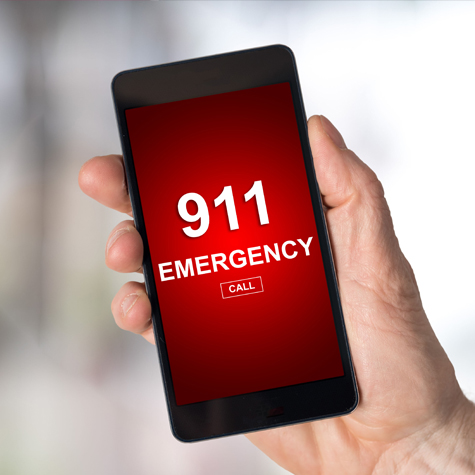You’ve got questions, we’ve got answers
If you dial 911 by mistake, or if a child in your home dials 911 when no emergency exists, DO NOT HANG UP - that could make the dispatcher think that an emergency exists and possibly send first responders to your location. Instead, simply explain to the dispatcher what happened.
The dispatcher is trained to ask questions for police, fire, and medical calls. The dispatcher is asking questions to provide as much information as possible to the first responders (police, fire, paramedics) for their and your safety, and so that the responders can efficiently help solve your problem when they arrive.
In addition, the dispatcher is trained to deliver potentially life-saving instructions over the phone before paramedics arrive. Asking these questions or giving instructions is not delaying help, as the COMPUTER-AIDED-DISPATCH (CAD) system allows for all the dispatchers in the communication center to work together. While one dispatcher is handling your call, another dispatcher is sending the help!
Some citizens reporting a problem want to sign a complaint and some do not. Regardless, the police officer will still respond to investigate the complaint, but needs to know if the caller needs to be seen once the investigation is complete. If you do not want to speak to a police officer, simply tell the dispatcher and they will let the police officer know.
All wireless phones including those that are not subscribed to or supported by a specific carrier can be used to dial 911. These uninitialized phones are often used to place malicious or fake calls to 911 call centers. These calls are a burden on the 911 system because they require the answering center to confirm whether or not an emergency truly exists.
Often times parents provide these uninitialized wireless phones as toys for young children, unaware that if the child dials 911, a live call will be connected with the local 911 call center. If a child dials 911 when no emergency exists do not hang up! That could make the dispatcher think that an emergency exists, and possibly send responders to the location. Instead, simply explain to the call-taker what happened.
When a dispatcher receives a 911 call from your land-line, they receive your address and phone number. When a dispatcher receives a 911 call from your cell phone, they receive your phone number and a latitude and longitude reading which then gets translated into an address.
It is a national standard to ask you for your address and then verify the information provided against what is on the computer screen in both cases. Verifying the location of the incident is the most important thing the dispatcher does. If we don’t get help to the correct location, we have failed. Computer systems can be wrong, so asking for the address and verifying it is crucial.
While an address or location is a vital piece of information, dispatchers are trained to deal with less than ideal circumstances. Dispatchers will have your child describe their surroundings and, if needed, will instruct them to go to a neighbors or ask anybody nearby for help.
Many 911 call centers follow protocols that guide callers through a sequence of questions to quickly obtain information necessary for dispatching the right responders to the right location. Dispatchers may also provide instructions about what to do until help arrives. Even though protocols are designed to help dispatchers reassure callers and take charge of the situation, the experience can be stressful for a 911 caller who is not accustomed to dealing with emergencies. When you call 911, be prepared to answer the dispatchers questions, which may include:
| 1. | The location of the emergency, including the street address |
| 2. | What city or town |
| 3. | The nature of the emergency |
| 4. | Details about the emergency, such as a physical description of a person who may have committed a crime, a description of any fire that may be burning, or a description of injuries or symptoms being experienced by a person having a medical emergency. |
Remember, the dispatchers questions are important to get the right kind of help to you as quickly as possible. Be prepared to follow any instructions the call-taker gives you. Many 911 centers can tell you exactly what to do until help arrives, such as providing step-by-step instructions to aid someone who is choking or needs first aid or CPR. Do not hang up until the dispatcher instructs you to do so.

